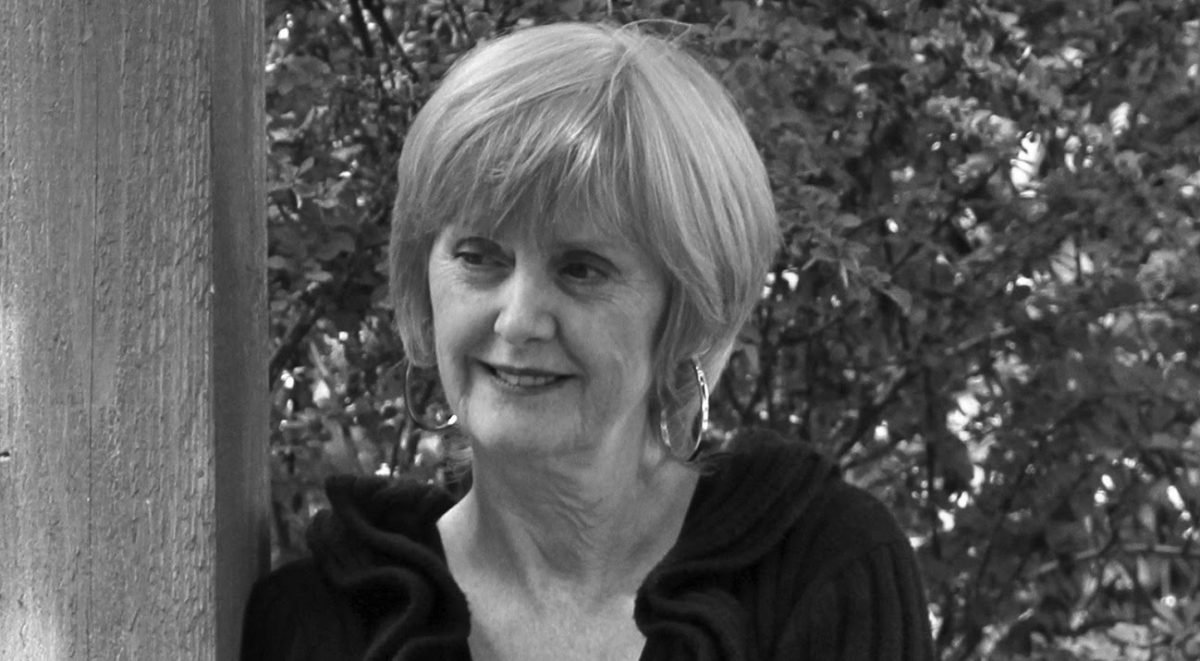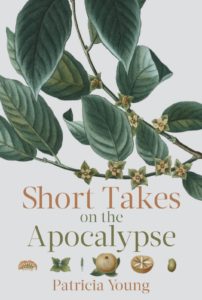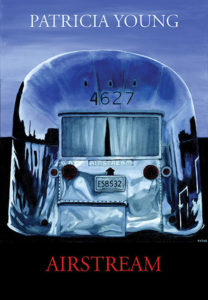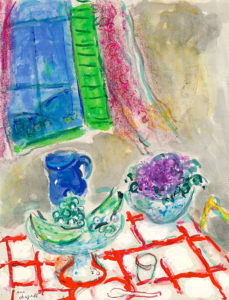
Former PRISM poetry editor (2014-15) Rob Taylor sat down with recent City of Victoria Butler Book Prize finalist Patricia Young to discuss her nominated poetry collection (and ninth, total) “Short Takes on the Apocalypse“.
Chagall’s Lovers – Patricia Young
Have faith, not cynicism. – Erica Jong
Why up there, young lovers,
helium heads
floating above the village?
Herringbone sky and forest of spires,
pointy church steeples…
How dare you fall in love when the world’s falling apart.
Down here death combs the countryside.
Every minstrel’s donkey’s splattered in blood.
Come down right now.
Your mother’s sick as a goat.
Your father’s marching into a century of slaughter.
Today is no one’s birthday.
That cake is proof of nothing.
Such wedding shoes! Such light!
Where’s it all coming from?
Can’t keep your feet on the ground.
Can’t keep your hands off each other.
Can’t stop blowing upside down kisses.
Why so ebullient, illogical, lobster-headed, topsy-turvied?
Fine… okay… stay up there
clucking Yiddish, barnyard babble.
Hey… I’m talking to you too blue fan.
I’m talking to you checked tablecloth.
I’m talking to you the colour red.
(Biblioasis, 2016).
Reprinted with permission.
Every poem in Short Takes on the Apocalypse opens with, and in some way speaks to, an epigraph. The book originated “as a response to Elmore Leonard’s “Ten Rules of Writing””, though you only confront/break one of Leonard’s ten rules in the book (“1. Never open a book with weather”), in your poem “Tornado in the Bible Belt”. Have you always felt the desire to break rules as a writer? How do you think the sense of rebellion and mischief that originated this book filtered out and affected the poems that followed?
 Yes, mischief. My first-year Creative Writing teacher back in the seventies gave the class a list of words we were not to use in our poems – soul, moon, sadness, tears, love, etc. So I wrote a poem using all those words. Nothing came of the poem but I did enjoy writing it.
Yes, mischief. My first-year Creative Writing teacher back in the seventies gave the class a list of words we were not to use in our poems – soul, moon, sadness, tears, love, etc. So I wrote a poem using all those words. Nothing came of the poem but I did enjoy writing it.
In the case of Short Takes on the Apocalypse, I didn’t set out to write a book of poems that all began with epigraphs. The book just evolved that way. I remember laughing when I read Elmore Leonard’s “Ten Rules of Writing” and though I agreed with them I liked the idea of trying to write poems that contradicted the rules in some way. I wrote a number of poems that argued with Leonard’s advice or did exactly the opposite of what he advised but most didn’t make it into the manuscript. But that little exercise generated the idea of pairing epigraphs with poems.
Well, if you stumbled into the idea, you stumbled into it thoroughly! Short Takes features 66 epigraphs from a wide array of people (“from Leonardo Da Vinci to Neil Gaiman, Margaret Atwood to Jimmy Kimmel” reads the back jacket copy). Only four contributors appear more than once: Kurt Vonnegut, Groucho Marx, Erica Jong, and everyone’s favourite writer, Anonymous. That’s one hell of a dinner party! How did you go about collecting the quotes? An active search, or just opening yourself to the universe, or? Were you surprised by the quotes that you were drawn to, and was there any pattern to the quotes that worked (or didn’t) as epigraphs?
I like the way you put that – yes, I did search and I also opened myself to “the universe.” Once I’d written a number of mostly unsuccessful poems triggered by Elmore Leonard, I started looking for other writers “rules” or advice because it was fun playing with people’s words. I was always interested in seeing where the epigraphs would lead. Of course, that’s generally why we write poems – to find out where an image or thought or line will take us. The poem you’ve highlighted, “Chagall’s Lovers,” was the result of viewing Chagall’s paintings at the Vancouver Art Gallery and coming across Erica Jong’s rules. I liked her point about writing and optimism. And optimism is exactly what Chagall’s art also seems to embody, despite the fact he was painting during the First and Second World Wars, a horrendous and bloody time in history.
The Guardian published a number of writers’ rules that I drew on. I also read interviews of writers and pulled out quotes of things they’d said. Sometimes a piece of advice triggered a poem; other times I just wrote a poem (as one does) and then sought out an epigraph that I felt added something to the poem, either by contradicting the epigraph or by throwing light on it or supporting some element of the poem.
Did you have to leave quotes you loved on the table because a poem wouldn’t come (and if so, do you want to share them here)?
Yes, I did leave hundreds of quotes on the table. Pages of them. You can imagine the amazing and funny and even profound things writers have said over the years about the craft, business and process of writing. Here are a couple of examples of those left behind:
“As a writer you are free. You are about the freest person that ever was. Your freedom is what you have bought with your solitude, your loneliness.”
– Ursula K. Le Guin“If I lose the light of the sun, I will write by candlelight, moonlight, no light. If I lose paper and ink, I will write in blood on forgotten walls. I will write always. I will capture lights all over the world and bring them to you.”
– Henry Rollins
I did write a poem triggered by the Henry Rollins quote but in the end cut it from the manuscript. Any response seemed inadequate to his words.
Though your poems are seldom purely humorous, most are speckled with jokes and winks. Is this a conscious choice of yours, or simply how you think and write? Does humour work its way into your poems differently than in your daily life?
I don’t consciously write poems that have humourous undertones (or overtones!) but I do gravitate toward poets whose work is often wry and displays wit and humour. I’m thinking of David McFadden’s poetry, for example, or the American poets, James Tate and Mark Halliday. The “big” subjects can sometimes be best explored when a little levity is introduced.
Your debut short fiction collection, Airstream, was published by Biblioasis in 2006 to critical acclaim (including being named a Globe and Mail Book of the Year). In the eleven years since you’ve published five new books of poetry, but no further fiction. What’s up, Patricia?
 Hell if I know! I wrote Airstream at a time when I couldn’t write poetry. I was stumped by poetry. It made no sense to me. I couldn’t read or write it. Also I was tired of poetry written from the first person, my own particularly. Fiction seemed a way out of the first person trap. I’d always loved short stories but around 2000 I began to read them not in a casual way but in a determined, I’m-going-to-figure-this-out sort of way. I went through old New Yorkers, years of them (my husband refuses to throw them out), and read all the short fiction. I also read the Journey Prize Anthologies and many collections of short fiction. Joy Williams was (and is) a favourite and inspiration. Though I’d written poetry forever, writing short stories was a huge learning experience. I know people say short fiction is like poetry in that both are condensed, every word matters and so on, but for me, writing fiction was a totally different process. Character, plot, dialogue, psychology, arc, etc. — all those things are not required of a poem. But after publishing Airstream I was keen to write poetry again, perhaps because I’d been away from it for five years.
Hell if I know! I wrote Airstream at a time when I couldn’t write poetry. I was stumped by poetry. It made no sense to me. I couldn’t read or write it. Also I was tired of poetry written from the first person, my own particularly. Fiction seemed a way out of the first person trap. I’d always loved short stories but around 2000 I began to read them not in a casual way but in a determined, I’m-going-to-figure-this-out sort of way. I went through old New Yorkers, years of them (my husband refuses to throw them out), and read all the short fiction. I also read the Journey Prize Anthologies and many collections of short fiction. Joy Williams was (and is) a favourite and inspiration. Though I’d written poetry forever, writing short stories was a huge learning experience. I know people say short fiction is like poetry in that both are condensed, every word matters and so on, but for me, writing fiction was a totally different process. Character, plot, dialogue, psychology, arc, etc. — all those things are not required of a poem. But after publishing Airstream I was keen to write poetry again, perhaps because I’d been away from it for five years.
Those long times away from each genre are interesting, especially because the movement between lineated poem and prose poem in Short Takes is very fluid. Has the prose poem allowed you to move what drew you to short fiction into your poetry; to explore both at once?
Often I come across poetry that reads like cut-up prose. When I find myself writing “cut-up prose” I shift to prose, to the short paragraph, to see how the piece works. My feeling is: if you’re writing sentences, acknowledge that, let your sentences have their day and be what they are.
As for the prose poem – I love the form and find myself writing prose poetry more and more lately. In a prose poem there is absolutely no room for excessive words. I like the sentence, I like narrative, the surreal leaps and huge scope of the prose poem, the sometimes upside-down world contained in a very short space. When I say “upside down” I’m thinking of Russel Edson’s prose poetry, for example, which Donald Hall describes as “fanciful” and “funny” but “carries discomfort with it, like all serious humor.”
There it is again: serious humour.
You’ve worked with a number of editors over the years: Michael Kenyon for some time, and also Dawn Kresan and, for this book, Anita Lahey. Could you talk about what these editors have brought to your work, and how it’s shaped the final products?
A good editor can save you from yourself. He or she sees the stories or poems (and the manuscript) from the outside and lets you know when you’re being self-indulgent or unfocused, what ought to be cut or what needs a serious re-write. I belong to a women’s writers group so I get feedback from them, but the editors you mention were the final readers and extremely helpful in all ways.
Short Takes sits in an interesting place when it comes to the current movement in Canadian poetry towards themed “projects” and away from general collections: it feels at once to be on trend, and pushing against the trend. It’s a “project” united by a common technique, and yet the poems seem utterly disparate, their subject matter going wherever the epigraphs lead them. What are your thoughts on poetry books as themed projects? What do you see as the pluses and minuses to this approach?
I enjoyed writing this book of poems because I could follow my nose, so to speak. The connection between poems is simply the epigraphs, though that is some sort of link. At one point I thought about cutting all the epigraphs and publishing the poems without them but couldn’t bear to part with so many wonderful words by other people.
I have written a few themed collections or collections of linked poems but mostly I tend to write what I call “miscellaneous” poems, poems that have no unifying theme, poems written one at a time, that are influenced by whatever I’m thinking about or reading or hear in conversation. The joy of writing a themed collection obviously is that you have a sense of what you’re going to be working on when you sit down to write. You can pick up where you left off the day before. When writing a general collection you have to face the blank screen after every poem. As a reader, I like both: miscellaneous poems because each one is a world unto itself and themed collections because they tell an extended story.
Speaking of facing the blank screen do you have a desire to “start fresh” from project to project (in theme, in style, in approach), and if so do you find it hard to shake your previous themes and techniques? Does something from one linger and move into the next? If so, what from previous books lingers in Short Takes, and what from Short Takes might linger in the next?
Airstream was definitely a fresh project. I knew nothing about writing fiction. The first story I wrote was from the first person point of view, which was familiar because I’d written so many first person pov poems. The second story I wrote had multiple points of view, which my husband pointed out was amateurish and revealed that I didn’t know what I was doing. I had no clue about the mechanics of writing fiction until I tried to write it. I really had to start from scratch but lately, with poetry, the “fresh start” never seems to happen because while a manuscript is being put together I am writing poems which become the genesis of the next collection. Goose Lane Editions is publishing my next book of poems (tentatively titled ““Amateurs at Love”) and it truly is a miscellaneous collection in that there are six distinct sections, though the sections themselves are in some sense organized around a theme. I would love to write another book of short fiction, another “fresh start” (though I have about five stories toward that fresh start). Just talking about it with you may well be the impetus I need to get on with it.
While you’re waiting for book of fiction #2, be sure to pick up a copy of Short Takes on the Apocalypse. You can do so at your local bookstore, or from the comfort of your home via the Biblioasis website. Or, if you want to break the “Ten Rules of Responsible Book Buying”, from Amazon.
You can read more of Rob Taylor’s interviews here.

